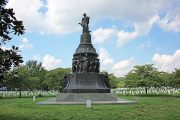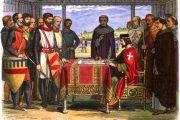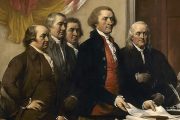Barack Obama (shown at National Prayer Breakfast) certainly makes his share of mistakes, from believing there’s a language called “Austrian” to claiming to have been to “57 states” to pronouncing “corpsman” “corpse-man” three times in the space of one minute. But while many of his displays of ignorance hurt mainly his own credibility, this was not the case during his speech at yesterday’s National Prayer Breakfast.
Talking about “faith being twisted and distorted,” Obama condemned the Islamic State jihadists as a “brutal, vicious death cult” and cited various Muslim terrorist acts as examples of using “religion” for nefarious ends. He then also said, however, “And lest we get on our high horse and think this is unique to some other place, remember that during the Crusades and the Inquisition, people committed terrible deeds in the name of Christ.”
It was entirely predictable. Political correctness demands we portray all religions as morally equal, and, when seeking to balance criticism of Islam with that of Christianity, the Crusades and the Inquisition are obvious whipping boys.
Of course, it is true that during the Crusades and the Inquisition (some) people committed terrible deeds, just as during WWII (some) Americans committed terrible deeds. Yet what’s implied, and certainly what will be inferred by most, is not that even during a justifiable event unjustifiable acts will occur. Obama was instead displaying — and trading upon — common misunderstandings of history.
The irony of citing the Crusades to balance criticism of Islamic jihad is that the Crusades were expressly designed as a defense against Islamic jihad. Unbeknownst to most, when Islam was born in 622 A.D., Christianity was the dominant religion in the Middle East and North Africa, with the latter having more Christians than Europe. So what happened?
The sword of Islam happened.
Beginning in 630, the Muslim hordes began their invasions; conquering the old Christian lands in short order, they swept through North Africa and then pushed into Iberia (present-day Spain and Portugal) and Gaul (France now). This incursion into Europe was finally halted at the Battle of Tours in 732, but the Muslims’ expansion would continue elsewhere for hundreds or years. And in 1095 they were attacking from the East, poised to move west into Greece itself or north into the Balkans — the “back door” of Europe. As Professor Thomas Madden, director of the Center for Medieval and Renaissance Studies at Saint Louis University, wrote in The Real History of the Crusades:
Christians in the eleventh century were not paranoid fanatics. Muslims really were gunning for them. While Muslims can be peaceful, Islam was born in war and grew the same way. From the time of Mohammed, the means of Muslim expansion was always the sword. Muslim thought divides the world into two spheres, the Abode of Islam and the Abode of War…. In the eleventh century, the Seljuk Turks conquered Asia Minor (modern Turkey), which had been Christian since the time of St. Paul. The old Roman Empire, known to modern historians as the Byzantine Empire, was reduced to little more than Greece. In desperation, the emperor in Constantinople sent word to the Christians of western [sic] Europe asking them to aid their brothers and sisters in the East.
[The Crusades] were not the brainchild of an ambitious pope or rapacious knights but a response to more than four centuries of conquests in which Muslims had already captured two-thirds of the old Christian world. At some point, Christianity as a faith and a culture had to defend itself or be subsumed by Islam. The Crusades were that defense.
(For more information, read “The Crusades: When Christendom Pushed Back,” The New American, February 2010.)
The “Inquisition” is an even stickier subject. In reality, there were numerous Inquisitions, including Protestant ones. But when the term is used, the allusion is usually to the Spanish Inquisition, which has become a poster boy for intolerance and religious persecution. Like the Crusades, however, Inquisitions are largely misunderstood.
“Burn the heretics!” It’s a cry we readily associate with the Middle Ages, but who first uttered it? While it’s assumed dealing with heresy was solely the Catholic Church’s domain, the first Inquisition (which was in southern France) wasn’t instituted until 1184, more than 1,000 years after Christianity’s inception. The reality is that no Inquisition was necessary to tamp down heresy — the state was performing that role with vigor. Why would this be? As Professor Madden explained in his essay “The Real Inquisition: Investigating the Popular Myth”:
For people who lived during those [medieval] times, religion was not something one did just at church. It was science, philosophy, politics, identity, and hope for salvation. It was not a personal preference but an abiding and universal truth. Heresy, then, struck at the heart of that truth. It doomed the heretic, endangered those near him, and tore apart the fabric of community.
As a result, Madden tells us, “Heresy was a crime against the state. Roman law in the Code of Justinian made it a capital offense. Rulers, whose authority was believed to come from God, had no patience for heretics. Neither did common people, who saw them as dangerous outsiders who would bring down divine wrath.”
Because heresy was analogous to treason, a person thus accused would be brought before the local lord for judgment. This presented many problems. As I wrote in “The Inquisition and Iniquity: Burning Heretics or History?”:
Not only might nobles be reluctant to devote the time necessary to assess a case fairly, but they had little if any theological training and were often arbitrary, capricious, and heavy-handed; they were hardly suited to judge whether a person really was a heretic or some hapless soul accused by enemies seeking revenge. The result was that many innocent people were tortured and killed.
Thus were Inquisitions finally instituted: to bring order to arbitrary justice, to “inquire” into the validity of heresy accusations. The result was, contrary to popular myth, that mercy was introduced into the process. As Catholic News Agency reported in 2004 citing a study by Italian history professor Agostino Borromeo:
“For a long time, judgments were confused with death sentences, and it was said that 100,000 were executed [during the Spanish Inquisition] — a figure completely unreal. Although some were sentenced to prison or to the galleys, most were given spiritual sentences: pilgrimages, penances, prayers, etc,” said Borromeo.
… Borromeo added that the total number of cases in the entire history of the Inquisition [in all nations] which resulted in death sentences is around 2%.
Even so, experts point out that execution was not Inquisition business. As Madden also wrote:
[Defendants] found guilty of grave error were allowed to confess their sin, do penance, and be restored to the Body of Christ. The underlying assumption of the Inquisition was that, like lost sheep, heretics had simply strayed. If, however, an inquisitor determined that a particular sheep had purposely left the flock, there was nothing more that could be done. Unrepentant or obstinate heretics were excommunicated and given over to secular authorities. Despite popular myth, the Inquisition did not burn heretics. It was the secular authorities that held heresy to be a capital offense, not the Church. The simple fact is that the medieval Inquisition saved uncounted thousands of innocent (and even not-so-innocent) people who would otherwise have been roasted by secular lords or mob rule.
So it appears Inquisition tribunals were much like modern courts: They judged only guilt or innocence under the law — they could not trump “mandatory sentencing.”
And as for that poster boy, the notorious Spanish Inquisition, how fearsome was it, anyway? It enjoyed at its peak the reputation of being the best run court in Europe. In fact, as the BBC documentary The Myth of the Spanish Inquisition pointed out, there were instances of state prisoners purposely blaspheming just so they would be transferred to Inquisition jails.
Given that Barack Obama has been wrong even about his own past — incorrectly claiming his father was in WWII and being guilty of other autobiographical errors — it’s not surprising that his grasp of the West’s past is wanting. But the gravity of the latter is no small affair. As George Orwell said, “The most effective way to destroy people is to deny and obliterate their own understanding of their history.”
The president of the United States should not be contributing to that obliteration.




